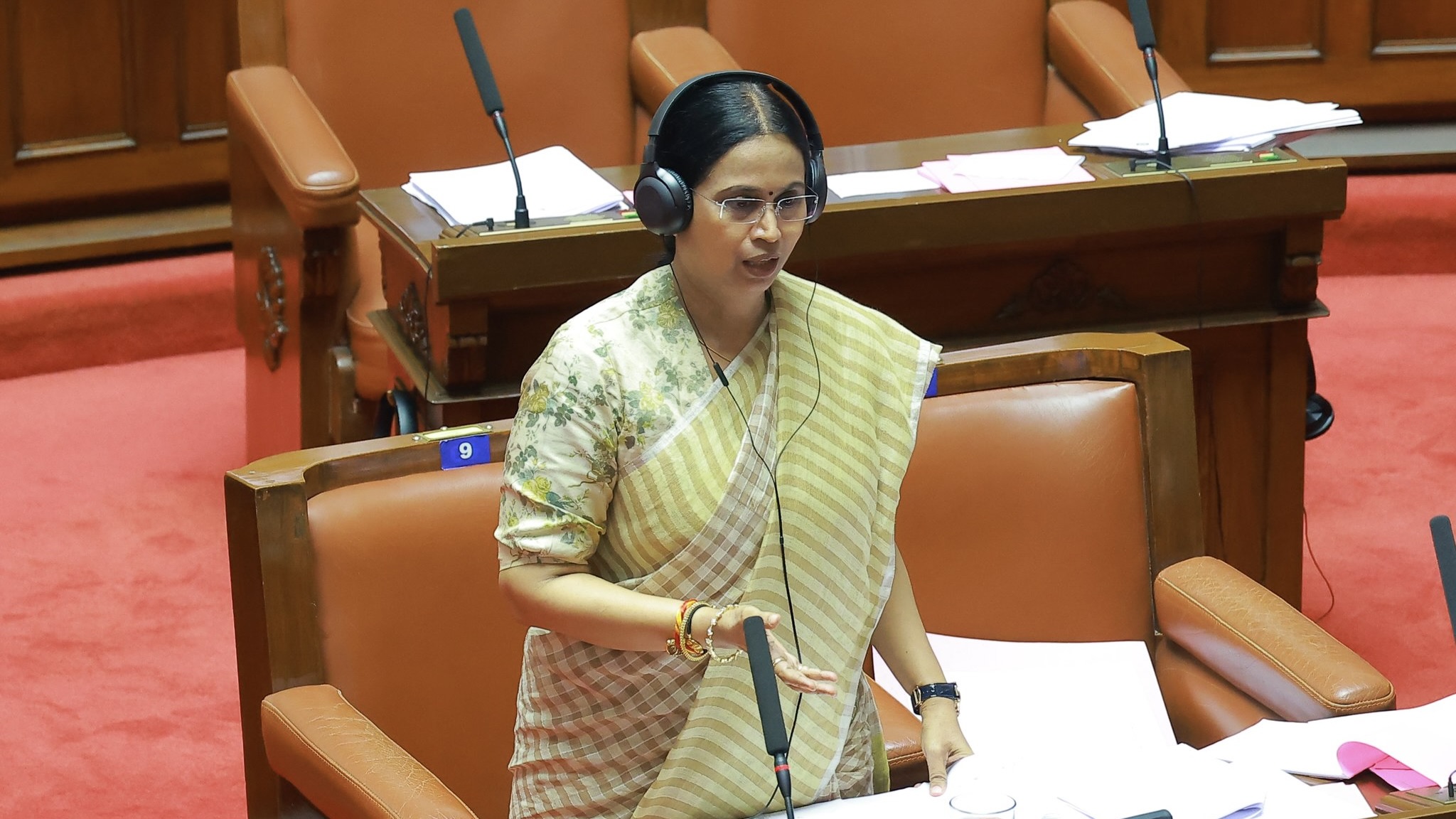Published Sep 18, 2025 | 9:00 AM ⚊ Updated Sep 18, 2025 | 9:00 AM

The Minister for Women and Child Development, Laxmi Hebbalkar.
Synopsis: Karnataka on 15 September launched its third survey to collect data on the socio-economic conditions of Devadasi women across 15 districts, as part of implementing new bill, passed in August, seeks to provide a legal definition of “Devadasi” and to extend social, educational, and economic rehabilitation measures. The survey, being conducted through two mobile applications, has already been disrupted by technical glitches, documentation issues, and low awareness among affected women.
A survey to collect accurate data on the socio-economic conditions of Devadasis in Karnataka began on Monday, 15 September, across 15 districts.
Devadasis are female ‘servants of god’, dedicated to serve a patron deity for their entire lives, but in reality forced into sexual slavery and exploitation in a system still prevalent across southern India.
The survey, the third such in Karnataka, is meant to extend social, economic, and educational rehabilitation measures under a new bill in the state, but it has already run into difficulties.
Technical glitches such as server problems and delays in receiving OTPs, along with documentation issues, disrupted the first few days of data collection.
More significantly, NGOs and activists involved in drafting the Karnataka Devadasi (Prevention, Prohibition, Relief and Rehabilitation) Bill, 2025, told South First that many women trapped in the system were not even aware that a survey was under way.
The bill, passed by the state legislature in August, among its provisions seeks to provide a clear legal definition of “Devadasi” to identify genuine beneficiaries and ensure their social, educational, and economic empowerment.
The last survey to identify women affected by the system was conducted in 2008, when 46,660 Devadasi women were recorded. The one before that, in 2007–08, also identified 46,660 women. However, several women said they had been left out, which in turn deprived them of benefits from government schemes.
Social activist Sitavva Joddati, a Padma Shri awardee who has spent decades working for the rehabilitation of women trapped within the Devadasi system, expressed hope that the re-survey would help restore dignity and opportunities to many marginalised women.
“There is however an urgent need for greater outreach efforts to ensure that all affected women are made aware of the survey and included in the process,” she told South First.
This year, the fresh survey is being carried out through two mobile applications. But server delays and patchy internet connections are also causing problems at taluk offices. Some areas reported delays in receiving OTPs during the registration process.
Under the newly-passed bill, the state government is required to constitute a committee at the taluk level, known as the Taluk Committee for Vigilance and Implementation, through a notification. These committees are meant to oversee the implementation of the bill.
They are to include the Tahsildar, members of the Devadasi community, and others. However, activists say these committees have not convened yet, despite it being mandatory under the bill.
“The committees seem unaware of how to collect the information and what documents are required. A lot of confusion persists,” said Saroja Ashok, member of NGO Sneha Trust in Ballari, one of the organisations that conducted fieldwork and provided inputs during consultations for the bill.
While NGOs like Sneha Trust are still conducting awareness sessions on the ground, Ashok said participation remains low, despite the option for self-declaration at taluk offices.
“On the first day, only three women came for self-declaration and four on the second day. We will keep encouraging them,” said Bhagya Lakshmi, Director of Sakshi Trust, Hosapete, another NGO involved in survey work.
In addition to poor awareness, Ashok said many Devadasi women were being asked to provide family tree documents to prove eligibility for benefits from government schemes. However, the bill does not include such a requirement.
“Since a family tree was not mandatory, Devadasi families were not prepared with those documents. In some taluks, children of Devadasi women are able to just self-declare and are not being asked for this document. There is no consistency yet across all taluks,” Ashok said.
The Devadasi system, believed to have its origins in the eighth century CE, has been illegal in Karnataka for several decades. Previous attempts to abolish it include the Madras Devadasis (Prevention of Dedication) Act of 1947, the Karnataka Devadasis (Prohibition of Dedication) Act of 1982, and its amendment in 2010.
Yet thousands of young women and girls are still forced into a lifetime of sexual exploitation, often by their families in the name of tradition and faith.
In 2022, the National Human Rights Commission (NHRC) issued notices to the governments of Karnataka, Andhra Pradesh, Telangana, and Maharashtra after taking suo motu cognisance of a media report that highlighted the persistence of the Devadasi system years after its legal prohibition.
The NHRC estimated that more than 70,000 women in Karnataka alone remain affected and called for accountability and detailed action plans from the states.
The new bill and the fresh survey are attempts to strengthen the fight against the centuries-old system.
It removes provisions that required a child born to a Devadasi to declare the name of their father while applying for essential public goods such as education, healthcare, and identity cards.
Another provision ensures that children born to Devadasi women are entitled to inherit property from both parents, even if the father’s identity is not declared.
These children will also have the right to establish paternity through biochemical methods, including DNA testing.
The Women and Child Development Department is required to identify the number of Devadasis and submit a district-wise report before 24 October 2025.
(Edited by Dese Gowda)

